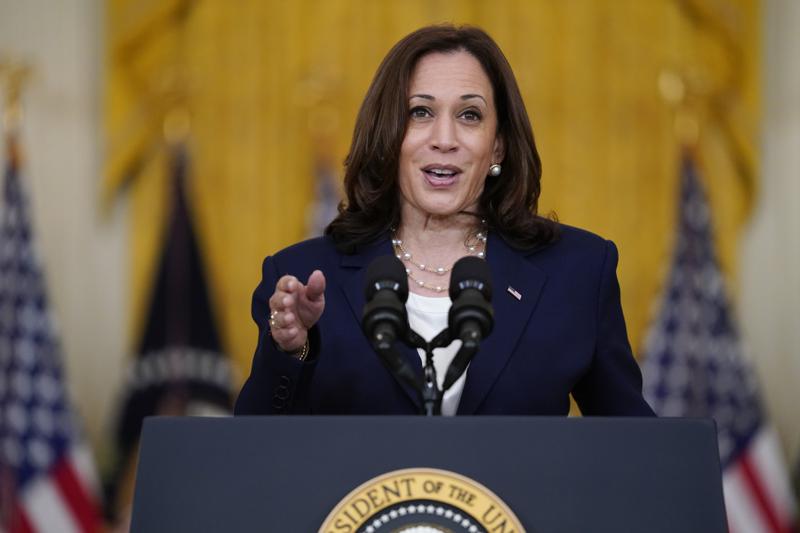Fresh US-led airstrikes target Houthi military sites in Yemen’s capital
A series of airstrikes hit Yemen's capital Sanaa on Tuesday afternoon, targeting military sites under Houthi control, Houthi-run al-Masirah TV reported.
Kamala Devi Harris, the first woman Vice President of the United States, will be leaving office in January 2025. Despite her Indian origin, not much has been written about her in India.

US Vice President Kamala Harris (File photo)
Kamala Devi Harris, the first woman Vice President of the United States, will be leaving office in January 2025. Despite her Indian origin, not much has been written about her in India. Her remarkable story deserves to be told for the global inspiration she provided as a leader, who ‘fights for those not in the room,’ lest her achievements risk being overlooked in a media landscape that often focuses solely on winners. Women in politics face numerous challenges, including time poverty, limited funding for campaigns and fewer opportunities for political training and mentorship.
Social media often exacerbates these issues, as women are disproportionately targeted by personal attacks that can drive them out of the political arena. Kamala’s advocacy for social causes began in school. In high school, she learned that her friend was being molested by her stepfather, who was permitted to stay in their home. This led Kamala to pursue a career as a prosecutor specializing in combating child sexual assault. She has championed legislation that improves the lives of survivors and strengthens penalties for offenders, promoting use of technology to address the backlog of sexual assault cases.
Advertisement
As a fierce advocate against human trafficking, Kamala launched a state-wide task force in California to combat human trafficking, uniting law enforcement and community organizations to raise awareness and enhance victim support services. Her initiatives led to increased training for law enforcement to better identify and assist trafficking victims. She fought for years to shut down a website (backstage.com) that facilitated human trafficking. As Attorney General, Kamala established initiatives that offered resources for survivors, including funding for shelters and programmes designed to help women escape domestic violence. Kamala has been a prominent champion of women’s rights, first as the Attorney General of California and later as a U.S. Senator and Vice President.
Advertisement
One notable programme she created provided first-time drug offenders with the opportunity to earn a high school diploma and find employment, becoming a national model for innovative law enforcement practices. Kamala has been a vocal advocate for reproductive rights, particularly after the US Supreme Court’s 2022 decision in Dobbs v. Jackson, which overturned the longstanding precedent of Roe v. Wade, guaranteeing the right to an abortion. Within a few months, the Supreme Court of India, in X vs Principal Secretary, Health and Family Welfare Department, Govt of NCT Of Delhi, has adopted a more progressive stance, affirming that the right to choose and reproductive freedom is a fundamental right. India is ahead of the USA in advancing women’s empowerment.
Since George Washington’s election as the first president in 1789, America has yet to elect a woman president in 235 years of electoral politics. Despite global advancements in gender equality, America remains behind. The responsibility for the lack of a woman president in the United States does not lie with one party alone, as both major parties have contributed to the status quo in different ways. The Democratic Party has shown a notably progressive approach, with four significant female nominations: two for president – Hillary Clinton in 2016 and Kamala Harris in 2024 – and two for vice president, with Geraldine Ferraro in 1984 and Kamala Harris in 2020. These milestones reflect the Democratic Party’s commitment to promoting women leaders.
On the other hand, the Republican Party has only nominated one female vice-presidential candidate, Sarah Palin, in 2008, and has not yet fielded a female presidential nominee. The party’s leadership has been slower to embrace female leadership compared to the Democrats, though figures like Nikki Haley and Condoleezza Rice have gained attention. Republicans may wish to compete with the Democrats in promoting gender diversity and 2028 will be their opportunity. With the Republican Party securing the 2024 victory, its leadership may take a moment to reflect and engage in a bipartisan effort to promote gender diversity. Looking ahead to 2028, both major parties could seize the opportunity to advance gender equality in leadership: In 2028, both parties may consider nominating women for the presidency to ensure America elects its first woman president. Imagine a historic race where Kamala Harris represents the Democrats and Nikki Haley, the former U.S. Ambassador to the United Nations, leads the Republican ticket.
This would guarantee that, regardless of the outcome, America will finally have a woman president – a breakthrough long overdue. On the Republican side, Nikki Haley’s pragmatism and international experience make her an appealing candidate. Her journey from the daughter of Indian immigrants to the governor of South Carolina and U.S. Ambassador to the U.N. exemplifies the American dream. The Democratic Party, on the other hand, may choose to rally behind competent women leaders, including Kamala Harris. A contest between female candidates from both major parties would be a step forward for gender equality in U.S. politics, guaranteeing that, regardless of party, America’s next president will be a woman. Nations such as Finland, Germany, India and New Zealand have demonstrated that women can lead with strength and empathy. India, a younger democracy, elected Indira Gandhi as its Prime Minister as early as 1966. Indira Gandhi showed women’s capability in governance and decisive leadership during the 1971 Bangladesh Liberation war. Since then, for the past four decades, men have ruled India. Reportedly a decisive force in recent elections, women should not be content with some promises made to them, but aim for the authority to promise.
(The writer is a transparency advocate and author. The views expressed are personal.)
Advertisement